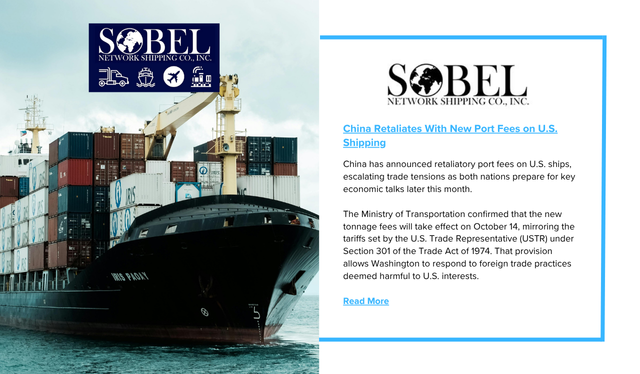China has announced retaliatory port fees on U.S. ships, escalating trade tensions as both nations prepare for key economic talks later this month.
The Ministry of Transportation confirmed that the new tonnage fees will take effect on October 14, mirroring the tariffs set by the U.S. Trade Representative (USTR) under Section 301 of the Trade Act of 1974. That provision allows Washington to respond to foreign trade practices deemed harmful to U.S. interests.
The move follows a USTR investigation launched during the previous administration, which concluded that China used state subsidies and industrial controls to build dominance in global shipping and shipbuilding.
China’s new port fees target U.S.-flag and U.S.-built vessels, as well as ships owned or operated by entities with more than 25% U.S. ownership, board representation, or voting rights.
Under the new structure, Chinese ports will charge $56 per net ton beginning October 14—slightly higher than the U.S. rate of $50 per ton. The fee will rise progressively to $90 per ton in April 2026, $123 in 2027, and $157 in 2028, matching U.S. fee escalations over the same period. Both nations’ charges apply only to a vessel’s first port call per voyage, up to five times per year.
Carriers expected to be impacted include Matson (NYSE: MATX), Maersk Line Limited, and APL, among others. In a customer advisory, Matson said it has “no plans to make any changes to our service schedule” and will not impose a surcharge linked to the new fees.
Industry analysts note that the policy could also extend to other carriers with significant U.S. ownership, including Israel’s Zim (NYSE: ZIM) and Singapore-based Seaspan, which operates a fleet of 100 chartered container vessels.
While the financial impact on U.S. carriers remains uncertain, HSBC estimates that Chinese operators Cosco and OOCL could face costs of more than $2 billion by 2026 due to reciprocal U.S. port fees and related trade measures.
The dueling tariffs and port fees underscore an intensifying maritime standoff ahead of the planned meeting between Presidents Xi Jinping and Donald Trump during the upcoming Asia-Pacific Economic Cooperation (APEC) summit in South Korea.


